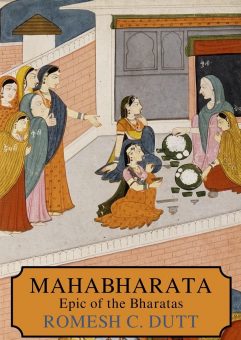And this carnage of the Kurus these sad eyes had never seen,
Peace had graced our blessed empire, happy would the earth have been!”
Long bewailed the sad Yudhishthir for his elder loved and dead,
And oblation of the water to the noble Karna made,
And the royal dames of Kuru viewed the sight with freshening pain,
Wept to see the good Yudhishthir offering to his brother slain,
And the widowed queen of Karna with the women of his house
Gave oblations to her hero, wept her loved and slaughtered spouse!
Done the rites to the departed, done oblations to the dead,
Slowly then the sad survivors on the river’s margin spread,
Far along the shore and sandbank of the sacred sealike stream
Maid and matron lave their bodies ’neath the morning’s holy beam,
And ablutions done, the Kurus slow and sad and cheerless part,
Wend their way to far Hastina with a void and vacant heart.
Book XII. Aswa-Medha (Sacrifice of the Horse)
[357] The real Epic ends with the war and the funerals of the deceased warriors. Much of what follows in the original Sanscrit poem is either episodical, or comparatively recent interpolation. The great and venerable warrior Bhishma, still lying on his deathbed, discourses for the instruction of the newly crowned Yudhishthir on various subjects like the Duties of Kings, the Duties of the Four Castes, and the Four Stages of Life. He repeats the discourses of other saints, of Bhrigu and Bharadwaja, of Manu and Brihaspati, of Vyasa and Suka, of Yajnavalkya and Janaka, of Narada and Narayana. He explains Sankhya philosophy and Yoga philosophy, and lays down the laws of Marriage, the laws of Succession, the rules of Gifts, and the rules of Funeral Rites. He preaches the cult of Krishna, and narrates endless legends, tales, traditions, and myths about sages and saints, gods and mortal kings. All this is told in two Books containing about twenty-two thousand couplets, and forming nearly one-fourth of the entire Sanscrit Epic!
The reason of adding all this episodical and comparatively recent matter to the ancient Epic is not far to seek. The Epic became more popular with the nation at large than dry codes of law and philosophy, and generations of Brahmanical writers laboured therefore to insert in the Epic itself their rules of caste and moral conduct, their laws and philosophy. There is no more venerable character in the Epic than Bhishma, and these rules and laws have therefore been supposed to come from his lips on the solemn occasion of His death. As a storehouse of Hindu laws and traditions and moral rules these episodes are invaluable; but they form no part of the real Epic, they are not a portion of the leading story of the Epic, and we pass them by.
[358] Bhishma dies and is cremated; but the endless exposition of laws, legends, and moral rules is not yet over. Krishna himself takes up the task in a new Book, and, as he has done once before in the Bhagavat-gita, he now once more explains to Arjun in the Anu-gita the great truths about Soul and Emancipation, Creation and the Wheel of Life, True Knowledge and Rites and Penance. The adventures of the sage Utanka, whom Krishna meets, then take up a good many pages. All this forms no part of the real Epic, and we pass it by.
Yudhishthir has in the meantime been crowned king of the Kurus at Hastinapura, and a posthumous child of Abhimanyu is named Parikshit, and is destined to succeed to the throne of the Kurus. But Yudhishthir’s mind is still troubled with the thoughts of the carnage of the war of which he considers himself guilty, and the great saint Vyasa advises the performance of the aswa-medha, or the Sacrifice of the Horse, for the expiation of the sin.
Pages: 1 2 3 4 5 6 7 8 9 10 11 12 13 14 15 16 17 18 19 20 21 22 23 24 25 26 27 28 29 30 31 32 33 34 35 36 37 38 39 40 41 42 43 44 45 46 47 48 49 50 51 52 53 54 55 56 57 58 59 60 61 62 63 64 65 66 67 68 69 70 71 72 73 74 75 76 77 78 79 80 81



